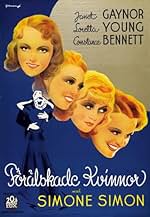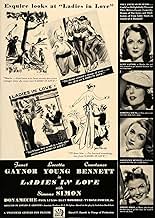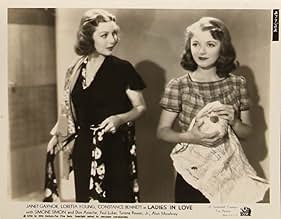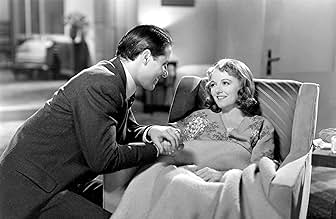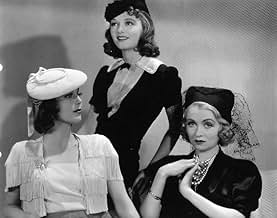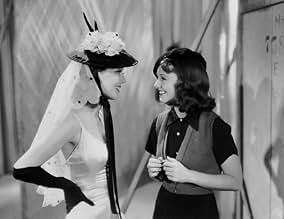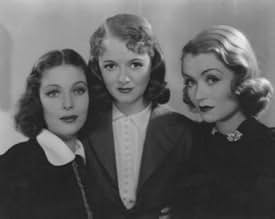Three working girls in Budapest pool their resources to get a better apartment and impress their dates. One dates a nobleman and, learning of her rejection by him, considers poison. Another ... Read allThree working girls in Budapest pool their resources to get a better apartment and impress their dates. One dates a nobleman and, learning of her rejection by him, considers poison. Another drinks the poison by mistake and lands a physician for herself. The third marries a busine... Read allThree working girls in Budapest pool their resources to get a better apartment and impress their dates. One dates a nobleman and, learning of her rejection by him, considers poison. Another drinks the poison by mistake and lands a physician for herself. The third marries a businessman. The first girl gets a shop of her own.
- Awards
- 1 win total
- Karl Lanyi
- (as Tyrone Power Jr.)
- Dress Shop Clerk
- (uncredited)
- Chauffeur
- (uncredited)
Featured reviews
The plot to this film is very much like the later film, "How to Marry a Millionaire". Three young ladies, Susie (Loretta Young), Yoli (Constance Bennett) and Martha (Janet Gaynor) are friends and decided to pool their money and rent a really swanky apartment instead of three separate crappy ones. The goal of this isn't only to live well but to help the women snag swanky husbands as well--and the film is all about their attempts to find the rich man of their dreams.
While I didn't love this film, the acting was very nice (you also get to see the likes of Don Ameche, Tyrone Power, Paul Lukas and Alan Mowbray in the film as well) and the story reasonably interesting. But as I mentioned above, what really caught my by surprise was the ending. It was NOT by the numbers and predictable. Overall not a great film but well worth watching.
The stories are set in Budapest, harnessed together by one of old Hollywood's most beloved artifices, the "three girls rooming together in poverty searching for husbands" plot. We are instantly thrown into the three romantic story lines, with the astonishing economy of old Hollywood that I fervently wish were still practiced today.
Bennett is engaged in a open, sensible affair with Paul Lukas, and is showily worldly and cynical, while using subtle cues to clue us into the real state of her heart. Young has a storybook romance going with a young nobleman, played by the preternaturally handsome Power, who could have used a bit more screen time, or so many of us might wish. Gaynor is in love with a irascible, jealous control freak doctor, Ameche, but is discharged by him when she starts to work for the pompous, self-centered Alan Mowbray, who is a conceited magician and who does a wonderful character turn in the typically delightful Mowbray style, which is to say, as gay as pink ink on scented paper.
I expected absolute fidelity to the standard Hollywood tropes and was pleasantly surprised to find the ending quite mixed. Young and Bennett reprise Young's comments about independence after being properly chastened by the absolute freedom enjoyed by the men in their lives, and Lukas is boldly tempted away from Bennett's side by Simon, playing a French schoolgirl who steals every scene she is in with her precocious grasp of the values of sexual audacity. There is a priceless moment, after she gets him to kiss her, a lingering kiss fraught with expectation and lacking in any visible restraint, where she looks at him in delight and barks a little laugh of knowing disdain and triumphant glee. Excellently put together and directed with great timing and sensitive performances, this film greatly exceeded my modest expectations.
Did you know
- TriviaThe film features 4 Oscar winners: Janet Gaynor, Loretta Young, Paul Lukas and Don Ameche.
- GoofsFrank Dawson is credited onscreen as "Johann," but he is called "Josef" in the film.
- Quotes
Susie Schmidt: [on dropping her plant] Oh, and I raised that thing from a twig!
Yoli Haydn: It's perfectly all right. All it needs is a new pot.
- ConnectionsFeatured in Tyrone Power: Prince of Fox (2008)
- SoundtracksKunstlerleben (Artist's Life), Op.316
(1867) (uncredited)
Written by Johann Strauss
In the score often
Played as dance music twice
Played also on a record
Details
- Release date
- Country of origin
- Language
- Also known as
- Jóvenes enamoradas
- Filming locations
- Production company
- See more company credits at IMDbPro
- Runtime1 hour 37 minutes
- Color
- Aspect ratio
- 1.37 : 1
Contribute to this page


